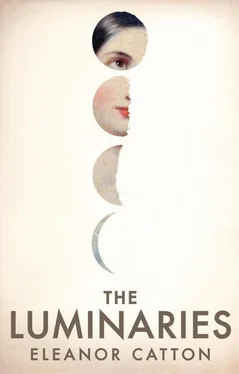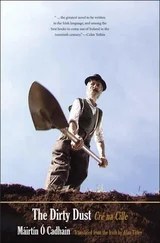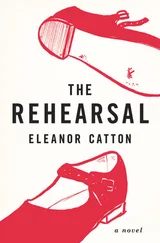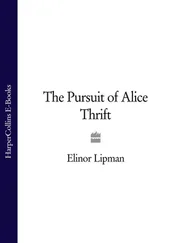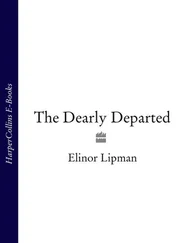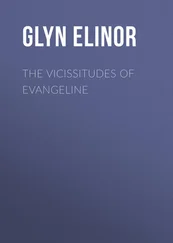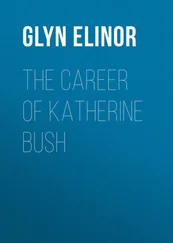(We shall add, in conciliatory tones, that his sulking was of a very superficial sort: at a single kind word from Lauderback, his good humour would be restored.)
Balfour pushed his chair a little further away from the table, wishing in a childish way to make his boredom obvious to his host, and cast his gaze over the room.
The dining room was nearly empty, owing to the uncommon hour of their meal, and through the serving-hatch Balfour could see that the cook had taken off his apron and was sitting with both elbows on the table, playing at solitaire. Before the hearth sat a large-eared boy who was sucking on a stick of jerky. He had evidently been posted there to keep an eye upon the clothes-irons, which were warming in a rack above the coals, for every half-minute or so he wet his finger and held it close to the trestle to test the heat. At the table nearest theirs sat a clergyman—a freckled fellow, none too handsome, with a snub nose and a droop to his lower lip, like a simple child’s. He had taken his breakfast alone; he was now drinking coffee and reading a pamphlet—no doubt rehearsing the sermon he would deliver the following day, Balfour thought, for he nodded slowly as he read, as a man keeping tempo with a silent address.
The large-eared boy wet his finger again, and held it close; the clergyman turned a page; the cook squared a playing card with the edge of the chopping block. Balfour fiddled with his fork. Finally Lauderback paused in his diatribe to take a draught of wine, and Balfour seized his chance to interject.
‘Speaking of barques,’ he said (they had been speaking of brigantines), ‘I’ve seen your Godspeed over the bar a fair few times, this past year. She’s yours, isn’t she— Godspeed ?’
But to his surprise, this remark was met with silence. Lauderback only bowed his head, as if Balfour had put to him an issue of the gravest philosophical import, and he desired to meditate alone upon the question.
‘Hell of an outfit, she is,’ Balfour added. ‘Marvellous.’
The aides exchanged a glance.
‘Surely that brings home our point, Mr. L,’ said Augustus Smith finally, breaking the spell. ‘Even a barque handles better than a brigantine; she does it with half the crew and half the fuss. He can’t deny that.’
‘Yes,’ Lauderback said, rousing himself. He turned to Jock. ‘You can’t deny that.’
Jock was chewing; he grinned through his mouthful. ‘I will deny it. Give me half the weight in rigging over half the crew—there’s your fuss. I’d take speed over handling any day.’
‘How about a compromise?’ said Augustus. ‘Barquentine.’
Jock shook his head. ‘I’ll say it again: three masts is one too many.’
‘More speed than a barque, though.’ Augustus touched Lauderback’s elbow. ‘What about your Flight of Fancy ? She was fore-and-aft rigged on the mainmast, was she not?’
Balfour had not intuited the aides’ objective—to divert the conversation away from the subject he had introduced—and he thought that perhaps the politician had not heard him correctly. He raised his voice and tried again. ‘Your Godspeed —as I say. She’s a regular, these parts. Hell of an outfit. I’ve seen her over the bar a fair few times. Seems to me she’s got both speed and handling. My word, she’s a marvellous craft.’
Alistair Lauderback sighed. He threw his head back and squinted up at the rafters, and a foolish smile trembled on his lips—the smile of a man who is unused to embarrassment, Balfour realised later. (He had never, before that morning, heard Lauderback confess a weakness of any kind.)
At last Lauderback said, still squinting upward, ‘That barque is no longer in my possession.’ His voice was strained, as though his smile had made it thinner.
‘That so!’ Balfour said, surprised. ‘Made a swap, did you—something bigger?’
‘No: I sold her, outright.’
‘For gold?’
Lauderback paused, and then said, ‘Yes.’
‘That so!’ Balfour said again. ‘Just like that—you sold her. Who’s buying?’
‘Her master.’
‘Hoo,’ said Balfour, exhaling cheerfully. ‘Can’t envy you there. We have heard some stories about that man around here.’
Lauderback did not reply. Still smiling, he studied the exposed beams of the ceiling, the cracks between the floorboards of the rooms above.
‘Yes,’ Balfour repeated, sitting back, and tucking his thumbs beneath his lapels. ‘We have heard some stories around here. Francis Carver! Not a man I’d care to cross, all right.’
Lauderback looked down in surprise. ‘Carver?’ he said, frowning. ‘You mean Wells.’
‘Master of the Godspeed ?’
‘Yes—unless he sold it on.’
‘Burly fellow—dark brows, dark hair, broken nose?’
‘That’s right,’ said Lauderback. ‘Francis Wells.’
‘Well, I don’t mean to contradict you flat,’ Balfour said, blinking, ‘but that man’s name is Carver. Perhaps you’re confusing him with the old fellow who—’
‘No,’ Lauderback said.
‘The hermit—’
‘No.’
‘Who died—the man you came across, two weeks ago,’ Balfour said, persisting. ‘The dead man. His name was Wells, you know. Crosbie Wells.’
‘ No ,’ Lauderback said, for the third time. He raised his voice slightly. ‘I am not mistaking the name. Wells was the name on the papers, when I signed the barque across. It was always Wells.’
They looked at each other.
‘Can’t understand it,’ Balfour said at last. ‘Only I do hope you didn’t get stiffed. Strange coincidence, isn’t it—Frank Wells, Crosbie Wells.’
Lauderback hesitated. ‘Not quite a coincidence,’ he said carefully. ‘They were brothers, I thought.’
Balfour gave a shout of laughter. ‘Crosbie Wells and Frank Carver, brothers? Can’t imagine anything more unlikely. Only by marriage, surely!’
Lauderback’s foolish smile returned. He began stabbing with his finger at a crumb.
‘But who told you that?’ Balfour added, when the other did not speak.
‘I don’t know,’ said Lauderback.
‘Carver mentioned something—when he signed the papers?’
‘Maybe that was it.’
‘Well! If you say so … but to look at them, I’d never have believed it,’ Balfour said. ‘One so tall and striking, the other such a wastrel—such a runt—!’
Lauderback quivered; his hand made a compulsive movement on the table, as if to reach and grasp. ‘Crosbie Wells was a wastrel?’
Balfour waved his hand. ‘You saw him dead.’
‘But only dead—never living,’ said Lauderback. ‘Strange thing: you can’t tell what a fellow really looks like, you know, without animation. Without his soul.’
‘Oh,’ Balfour said. He contemplated that idea.
‘A dead man looks created,’ Lauderback continued. ‘As a sculpture looks created. It makes you marvel at the work of the design; makes you think of the designer. The skin is smooth. Fine. Like wax, like marble—but not like either: it doesn’t hold the light, as a wax figure does, and it doesn’t reflect it, like stone. Has a matte finish, as a painter would say. No shine.’ Suddenly Lauderback seemed very embarrassed. He rounded off by demanding, rather rudely, ‘Have you ever seen a man fresh dead?’
Balfour tried to make light of it (‘Dangerous question to ask—on a goldfield—’) but the politician was waiting for an answer, and at length he had to concede that he had not.
‘Shouldn’t have said “seen”,’ Lauderback added, to himself. ‘Should have said “bore witness”.’
Augustus Smith said, ‘Jock put his hand on the fellow’s neck—didn’t you, Jock?’
‘Ay,’ said Jock.
Читать дальше
